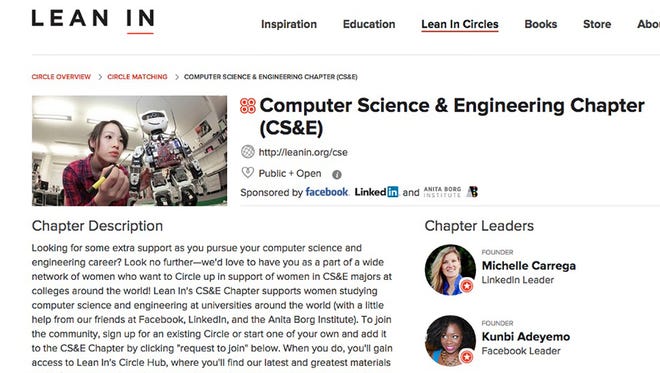Facebook's Sandberg: Women engineers should Lean In

Facebook's Sheryl Sandberg wants women to make up half the computer engineers and coders at the wildly popular social media site, and that's a math problem.
If women account for less than 20% of the graduates in computer science and engineering, it's hard to get to 50%, she says.
"The reason there aren't more women in computer science is because there aren't more women in computer science," Sandberg, who is chief operating officer of the social networking giant, said in an interview.
Cue up Lean In Circles, the movement of peer-support groups Sandberg started nearly two years ago with the profits from her best-selling book, Lean In.
On Friday, Sandberg and technology heavy hitters from LinkedIn and the Anita Borg Institute for Women and Technology issued a call to action for women in math, engineering and computer science to form peer support groups and unite under the banner of the Lean In Foundation's first global chapter for women in computer science and engineering on college campuses.

The circles, small groups of 10 to 12 women and men who meet regularly to share their ambitions and support one another in their quest to achieve them, have grown from a germ of an idea in Sandberg's book to a phenomenon that has spread to 97 countries and 350 college campuses. The Lean In Foundation website, Circles Hub, where the groups can register, cyber mingle and access subject matter and leadership resources, now counts more than 21,500 circles. In some cities and college campuses, the circles have come together to form chapters that exchange ideas, network and host events.
The chapter for Women in Computer Sciences and Engineering marks the first time the Lean In Foundation has sponsored an affinity group, Sandberg said. The CS&E Chapter describes itself as a "wide network of women who want to Circle up in support of women in CS&E majors at colleges around the world."
By partnering with LinkedIn, the electronic Rolodex for job hunting and resume promoting, employers will be able to connect with women in technical fields.
"The real dream is to change the numbers," Sandberg said. "We want to change the numbers in leadership, in every industry. If you think of where our economy is head, it has to be math."
Denise Gosnell learned the power of the peer group in 2012 at the University of Tennessee's PhD program in computer science, where just 1 in 5 students is female. To combat the isolation she felt, Gosnell and her female classmates formed a study group. That year, at the recommendation of a mentor, she also attended the Grace Hopper Celebration for Women in Computing, an annual conference sponsored by the Anita Borg Institute, one of the sponsors of the new Lean In chapter. It was a revelation.
"It was a network of 3,000 women who were in my exact same shoes. I thought, 'Where have you all been,'" Gosnell said.
In 2013, department leaders invited Gosnell's study group to a meeting to discuss gender disparity in computer science and engineering. A prominent nuclear engineer and school alumnus offered her $10,000 Gosnell to start a group that would help women in the department attend technical conferences, she said. In April 2013, the study group became "The Systers," – as in computer 'systems', Gosnell explains, which raised an additional $40,000 to send 25 women to conferences.
Gosnell, now 28 and a data scientist for a start-up called PokitDok, and the "Systers" helped launch Lean In Circles for women in computing at the Grace Hopper Celebration in October 2013 in Minneapolis, where Sandberg was a keynote speaker. Back at school, Gosnell taught a seminar for credit based on a chapter-by-chapter discussion of Lean In.
Jessica Boles, an undergraduate in electrical engineering where women account for less than 10% of the students, took the class.
"It opened my eyes," Boles said. "This is not a perfect field for women yet, but it can be. We just have to keep pushing."
For her final exam, Boles created a 90-second recruitment commercial featuring female engineers around Knoxville. A crowd funding campaign that sought $800 raised $5,000. Boles also founded, organized and raised the money for the school to host WOMengineers Day, a free one-day conference, in April.
"Spreading what we're doing to everyone is definitely our dream," Boles said. "I'm highly, highly passionate about recruiting women to our field."